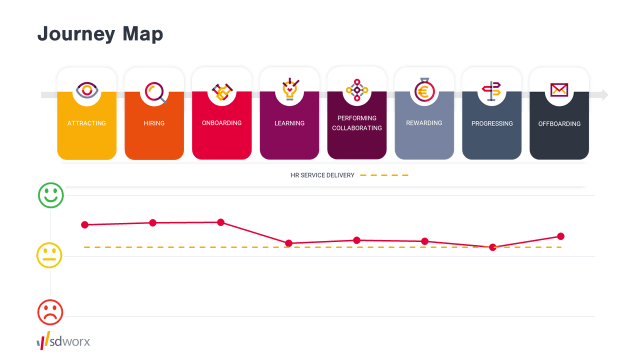Being highly engaged in your job while enjoying it at the same time: that's employee engagement. Engaged employees are satisfied with their job and are less likely to quit. They are also more willing to go the extra mile and feel more committed to their organization (Saks, 2006). Employers therefore have every interest in keeping employee engagement high. And yet, statistics show that this is very hard. So how cán you build and maintain employee engagement?
Less than 1 in 5 feels engaged
Only 15% of employees worldwide feel engaged (Gallup, 2021). Statistics are slightly higher in Europe (19%), but it still means that less than 1 in 5 feels engaged and energized at work (SD Worx, 2021). The coronavirus crisis, with its remote work, was of no help either: after one year, more than half of the employers see a clear negative effect of the crisis on employee engagement. Half of the surveyed employees feel this negative effect too. In addition, 1 in 4 indicate that they don’t feel connected to their organization (Vangronsvelt & De Vos, 2021).

What makes someone feel engaged?
Meaningful work is a key factor of employee engagement. Feeling that your job is meaningful and contributes to the organizational goals, makes you want to put more effort in it and allows you to get more pleasure out of it. In 2016, the extensive baseline measurement of meaningful work in Flanders found that 73% of 47,771 Flemish respondents rated their job as meaningful. And almost half (49%) felt that their job gave meaning to their lives (Stuer & De Vos, 2016). 5 years later, in the middle of the COVID pandemic, thankfully, this seems to have changed very little: 76% still find their job as meaningful as before the crisis and 17% even find their job more meaningful (Vangronsvelt & De Vos, 2021). 3 out of 4 employees also clearly see the relevance of their individual contribution to the organizational goals (SD Worx, 2021). For 80%, in April 2021, it is equally clear what their job contributes to and for 14% this is even more clear than before the crisis (Vangronsvelt & De Vos, 2021).
If you turn these positive figures around, 1 in 4 employees still thinks that their job is not meaningful. Yet a lack of meaningfulness does not seem to be the main cause of low employee engagement rates. So what other factors are driving employee engagement?
- Perceived organizational and management support. When employees feel a personal connection with their manager and are given development opportunities and autonomy, they will feel more committed and energized (Breevaart, Bakker, Demerouti, & Van Den Heuvel, 2015).
- Perceived fairness. When employees feel that their employer's decisions are fair and that the decision-making process is just, they will be more committed (Colquitt et al., 2001).
- Rewards and recognition. When employees receive recognition (especially from their manager), they see this as an acknowledgement of their place within the group. This will increase their commitment (Greco, Laschinger, & Wong, 2006). Salary is a concrete form of rewards and recognition. Mind you, high pay combined with poor working conditions is the recipe for the so-called golden cage, which is, of course, bad news for employee engagement.
How do you build and maintain high employee engagement?
If we apply these drivers of employee engagement to the different stages an employee goes through (the employee experience journey, see figure), we arrive at the following recommendations:
- When hiring new employees, an employer can already use organizational support as an asset by, e.g., highlighting a comprehensive onboarding program or promoting a buddy program. In addition, it is key for organizations to be authentic during the hiring process. After all, what is a meaningful, engaging organization for some may not be so for others.
- Onboarding is the perfect opportunity to embed employees within the organization. A good onboarding process should lead to a sense of belonging to the "organizational family" while being valued for your unique contribution to the team (Randel et al., 2018).
- Feeling that you can learn is also a form of recognition. The organization thus shows that the employee is worth investing in. And the learning itself makes the job even more meaningful (Stuer et al. 2019).
- A fair reward system reflects justness. In turn, flexible, tailor-made rewards show recognition and lead to a better embedding within the organization.
- A clear assessment process and transparency about internal mobility are particularly important to maintain perceived fairness (Colquitt et al., 2001). The organization thus shows who did well and who deserves to be promoted.
- Compliant and respectful offboarding also has a positive effect on employee engagement with those who stay (Colquitt et al., 2001). Moreover, it is important to foster good relationships with ex-employees in an increasingly flexible job market where organizations are creating more and more a layer of flexible workers (contract workers, self-employed, etc.).
10 blog posts for 10 years of Next Generation Work
This blog post is the fourth in a series of 10. In each blog post we will offer solutions from different perspectives, as a count down to November 2021, the moment when we bring everything together in the celebration of 10 years of Next Generation Work. We already look forward to welcoming you there. More information will follow in the next few months.

comments0
You don't have the rights to read or add a comment.
Suggested Articles



